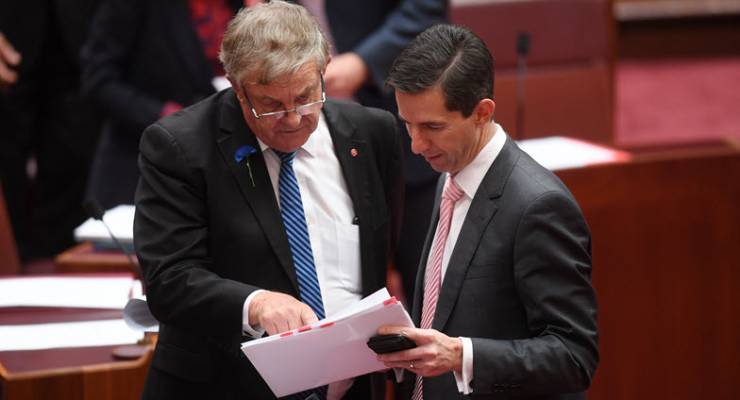
It says much about the current state of federal Parliament that the government securing passage of $24 billion in additional schools funding is a big win, but it is. The economic reform purists won’t like it, and the sectarian rent-seekers of the Catholic education sector will complain, but this is reform that ticks the right boxes. It’s investment in human capital — exactly of the kind Reserve Bank head Phillip Lowe said should be a priority days ago. It reduces a misallocation of spending that has no economic benefit, it implements a sound funding model, and it does so in the face of opposition from influential sectors.
It’s not perfect — it’s a shame that an extra $50 million will be handed to the already overfunded Catholic sector — but the reversal of the position adopted by the Abbott government in its early days is now complete. There will be additional funding, and there will be the features that then-education minister Christopher Pyne mocked and derided nearly four years: there will be a central body to oversight funding, there will be mechanisms to vet state government funding to ensure they maintain their funding. What was once a virtue — letting the states do whatever they like on school funding — is now a vice to be rigorously guarded against. And correctly so — the history of Commonwealth-state financial relations is the history of cost-shifting by the latter every time the Commonwealth provides funding.
[Doin’ the Gonski — a history of the Liberals’ school funding dance]
This is the kind of reform that Australia needs to be doing. Once you get beyond the hollow cliches and neoliberal nonsense of the business sector’s reform calls — less industrial relations regulation so companies can cut wages more, lower company tax rates, deregulation at any cost — where are the major reform priorities? Climate action, infrastructure, housing affordability and human capital — making our education and health systems work as effectively and efficiently as possible so that Australians can make the most of their opportunities in an era of challenging technological development.
[The ex-MPs sent out to spruik for the Catholic schools]
The other positive of the government’s funding package (Turnbull’s appalling appellation Gonski 2.0 should be taken out behind the Senate and shot) is that it also makes a start on reducing inequality in an age when inequality has worsened significantly. It could go much, much further — hundreds of millions could be saved by slashing funding to wealthy schools of all creeds and colours — but anything that targets inequality, the ever-present, background radiation of neoliberalism, is a good start. This won’t deliver equality of opportunity for school kids no matter their background, but it will shift a little toward that.
Now we’re left to watch an experiment — one you would have mocked as utterly implausible even a few years ago, let alone back in the days of Mark Latham’s private school hit list. Can Labor, in an alliance with the Catholic school sector, turn this into a campaign issue that will worry Coalition backbenchers enough that they start to panic?
That can be a problem for down the track. For today, Malcolm Turnbull and his minister Simon Birmingham can enjoy a welcome, and deserved, political and policy win.








Remember Bernard, Christopher “the fixer” Pain proudly announced that he “couldn’t give a Gonsky”.
Well, Bernard, good to see that you are so pleased for the PM. As my poor state school waves goodbye to $800,000 I will keep your comments in mind. Perhaps you should spend less time dining with the PM and listen to others, like the AEU and parent organisations. Sorry to be such a purist, but it looks like the end is on it’s way for my sub in August.
The private schools will still get more than they need and the public schools will still get less than they need. The SES model is just the easiest dumbest way of doing this – the flawed logic that need is measured by the children’s post codes will continue to favour private schools.
Dumbed down and over-simplified processing didn’t work so well for Centrelink did it?
It’s 5% extra over 10 years, or .5% per annum, a small hill of beans in a budget of $450 billion over 10 yrs and it locks in 80% of funding to go to private bloody schools. You really are stupid sometimes Bernard.
Wrong on virtually all counts.
The final deal is $23b extra over 10 years (compared to 2016 budget) on a Commonwealth education budget of $247b. So nearly a 10% boost.
Next, the fact that it locks in 80% of funding to non-government schools is correct; but no real change from Labor’s model. Labor would have delivered ~78% of the funding to non-government schools, including vastly more wasted money to over-funded private schools (i.e. well above target).
I agree with Bernard that this won’t solve inequality, but it is a step in the right direction.
Go Marilyn!